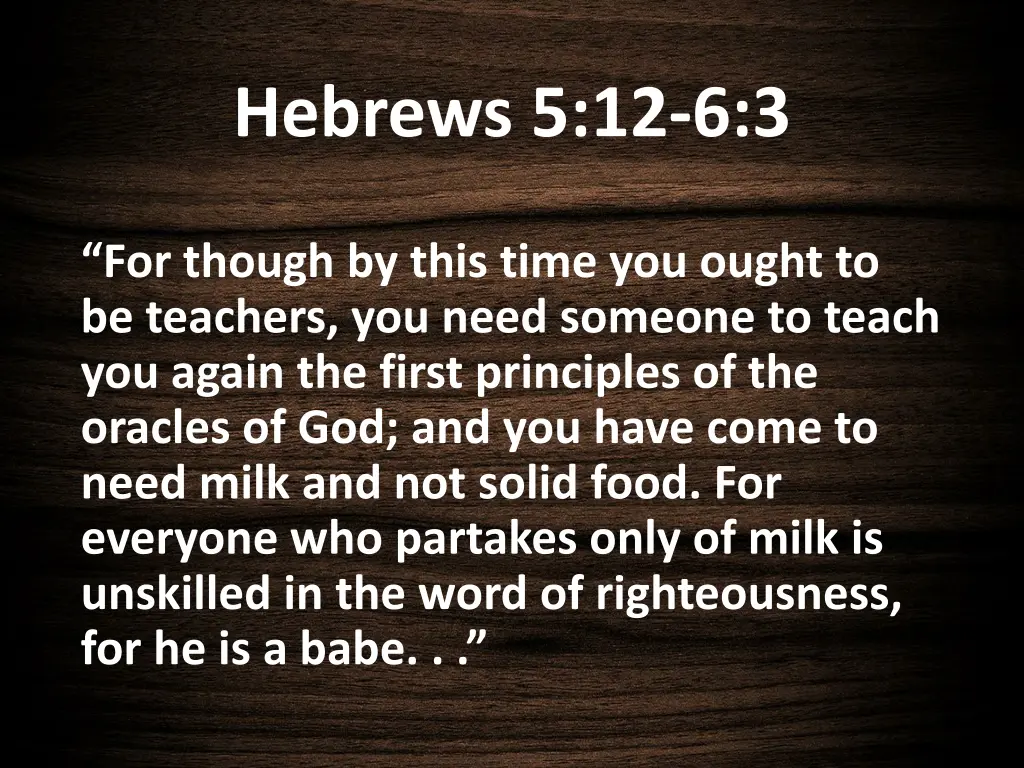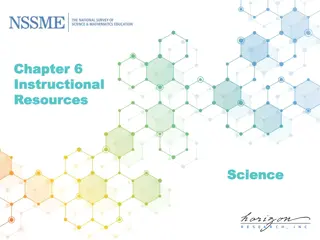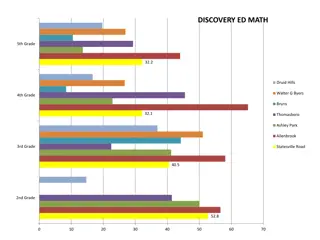
Exploring the Elementary Principles of the Christian Faith
Delve into Hebrews 5:12-6:3 which discusses the transition from spiritual infancy to maturity, emphasizing the importance of moving beyond basic teachings towards a deeper understanding of faith. Explore concepts such as repentance from dead works and faith toward God, essential aspects of Christian doctrine. Gain insights into the significance of progressing towards spiritual maturity and discerning good from evil in the journey of faith.
Download Presentation

Please find below an Image/Link to download the presentation.
The content on the website is provided AS IS for your information and personal use only. It may not be sold, licensed, or shared on other websites without obtaining consent from the author. If you encounter any issues during the download, it is possible that the publisher has removed the file from their server.
You are allowed to download the files provided on this website for personal or commercial use, subject to the condition that they are used lawfully. All files are the property of their respective owners.
The content on the website is provided AS IS for your information and personal use only. It may not be sold, licensed, or shared on other websites without obtaining consent from the author.
E N D
Presentation Transcript
Hebrews 5:12-6:3 For though by this time you ought to be teachers, you need someone to teach you again the first principles of the oracles of God; and you have come to need milk and not solid food. For everyone who partakes only of milk is unskilled in the word of righteousness, for he is a babe. . .
Hebrews 5:12-6:3 . . . But solid food belongs to those who are of full age, that is, those who by reason of use have their senses exercised to discern both good and evil. Therefore, leaving the discussion of the elementary principles of Christ, let us go on to perfection, not laying again the foundation of repentance from dead works and of faith toward God. . .
Hebrews 5:12-6:3 . . . of the doctrine of baptisms, of laying on of hands, of resurrection of the dead, and of eternal judgment. And this we will do if God permits (NKJV).
Hebrews 5:12-6:3 Elementary principles of Christ (6:1) First principles (ASV) The of-the beginning of-the Christ word The word of the beginning of the Christ
Elementary Principles 1. Repentance from Dead Works How much more shall the blood of Christ, who through the eternal Spirit offered Himself without spot to God, cleanse your conscience from dead works to serve the living God? (Heb. 9:14). Christ s blood cleanses from all sin (1 John 1:7).
Elementary Principles 1. Repentance from Dead Works Good works (Matt. 5:16; Eph. 2:10; etc.) Wicked works (Col. 1:21) Evil works (1 John 3:12) Works of darkness (Rom. 13:12) are unfruitful works (Eph. 5:11) Works of the flesh disqualify from inheriting kingdom of heaven (Gal. 5:19-21).
Elementary Principles 1. Repentance from Dead Works These are dead works. Christ s blood cleanses such works when one will repent, turn to God, and do works befitting repentance (Acts 26:20). Repentance from dead works is an elementary principle of the doctrine of Christ.
Elementary Principles 2. Faith toward God But without faith it is impossible to please Him, for he who comes to God must believe that He is, and that He is a rewarder of those who diligently seek Him (Heb. 11:16). Faith toward God means belief in the One sent from God (John 17:21).
Elementary Principles 2. Faith toward God Jesus said, you believe in God, believe also in Me (John 14:1). Belief in Jesus is belief in God Immanuel = God with us (Matt. 1:23). In Christ, dwells all the fullness of the Godhead bodily (Col. 2:9).
Elementary Principles 2. Faith toward God For with the heart one believes unto righteousness, and with the mouth confession is made unto salvation (Rom. 10:10). Faith in Christ is an elementary principle of the doctrine of Christ.
Elementary Principles 3. The Doctrine of Baptisms Gr. baptismos, Pharisees traditions of washing of pots and cups (Mark 7:4, 8) Mosaic ceremonial washings (Heb. 9:10). Related to baptisma, used of a specific type of washing commanded by Christ.
Elementary Principles 3. The Doctrine of Baptisms Jesus taught, He who believes and is baptized will be saved (Mark 16:16a). Make disciples baptizing them in the name of the Father and of the Son and of the Holy Spirit (Matt. 28:19).
Elementary Principles 3. The Doctrine of Baptisms In baptism one is buried with Christ (Rom. 6:3-4) Puts on Christ (Gal 3:26-7) Has sins washed away (Acts 22:16).
Elementary Principles 3. The Doctrine of Baptisms It is the washing of regeneration, and renewing of the Holy Spirit (Titus 3:5). Baptism is an elementary principle of the doctrine of Christ.
Elementary Principles 4. Of Laying on of Hands Doctrine. . . applies to last four Different ways in the New Testament. Seizing someone for punishment or imprisonment (Matt. 18:28; 21:46; 26:50; Mark 12:12; Luke 20:19; John 7:44; 8:20; Acts 4:3; 21:27; perhaps 1 Tim. 5:22, cf. 5:19-21).
Elementary Principles 4. Of Laying on of Hands Manner apostles could heal the sick (Mark 16:18) Affectionate approval of a work begun Appointment of the seven Acts 6:6 Sending off of Paul and Barnabas Acts 13:3 Special application to the role and work of the apostles.
Elementary Principles 4. Of Laying on of Hands Following Pentecost (Acts 1:8; 2:1-4), the apostles could lay hands upon those to whom they chose to grant different miraculous spiritual gifts (Acts 8:17, 18, 19; 19:6; 2 Tim. 1:6; perhaps 1 Tim. 4:14). Simon tried to purchase this ability and was rebuked (Acts 8:19-24).
Elementary Principles 4. Of Laying on of Hands Could not be passed on Passed away with the completion of revelation and with the death of the apostles and those upon whom they had laid hands. Still operated in living apostles and those who had received the laying on of hands.
Elementary Principles 4. Of Laying on of Hands Served to complete revelation and confirm that their teaching was from God. Understanding the nature of the laying on of hands and what it revealed about the teaching of the apostles is an elementary principle of the doctrine of Christ.
Elementary Principles 5. Of Resurrection of the Dead Of the dead plural in Greek Not equated with repentance from dead works or the doctrine of baptisms not referring to the spiritual renewal that comes from repentance and baptism (cf. Acts 3:19; Rom. 6:3-7).
Elementary Principles 5. Of Resurrection of the Dead Women received their dead raised to life again. And others were tortured, not accepting deliverance, that they might obtain a better resurrection (Heb. 11:35). OT raised only to die again (cf. 1 Kings 17:22- 23; 2 Kings 4:32-37)
Elementary Principles 5. Of Resurrection of the Dead Better resurrection means they cannot die anymore (Luke 20:36). Does not happen at the point of death. Jesus promised He will raise up the faithful at the last day (John 6:39,40, 44, 54)
Elementary Principles 5. Of Resurrection of the Dead He accepted without rebuke Martha s statement that her brother, will rise again in the resurrection at the last day (John 11:24). A resurrection of the dead, both of the just and the unjust (Acts 24:15).
Elementary Principles 5. Of Resurrection of the Dead Jesus explained, the hour is coming in which all who are in the graves will hear His voice and come forth those who have done good, to the resurrection of life, and those who have done evil, to the resurrection of condemnation (John 5:28-29).
Elementary Principles 5. Of Resurrection of the Dead Jesus said the, Sadducees, who say there is no resurrection (Mark 12:18) were greatly mistaken (Mark 12:27). Paul taught that those who claim the resurrection is already past actually overthrow the faith of some (2 Tim. 2:18).
Elementary Principles 5. Of Resurrection of the Dead Jesus s resurrection is described as the firstfruits of those who have fallen asleep (1 Cor. 15:20) Suggests will be similar to His in nature. Like Jesus, our corruptible bodies will be raised incorruptible (1 Cor. 15:52).
Elementary Principles 5. Of Resurrection of the Dead Paul explains of the resurrection of the dead. The body is sown in corruption, it is raised in incorruption (1 Cor. 15:42). Like His resurrection, Christ the firstfruits, afterward those who are Christ s at His coming (1 Cor. 15:23).
Elementary Principles 5. Of Resurrection of the Dead Belief in the bodily resurrection of the dead is an elementary principle of the doctrine of Christ.
Elementary Principles 6. Of Eternal Judgment It is appointed for men to die once, but after this the judgment (Heb. 9:27). Does this mean final judgment at death? No. Jesus promised resurrection at the last day the word that I have spoken will judge him in the last day (John 12:48).
Elementary Principles 6. Of Eternal Judgment Began 9:27 with And as Continues so Christ was offered once to bear the sins of many. To those who eagerly wait for Him He will appear a second time, apart from sin, for salvation (Heb. 9:28).
Elementary Principles 6. Of Eternal Judgment So, judgment of verse 27 is when Christ will appear a second time. . . for salvation. Those who turn back to sin after learning the truth, a certain fearful expectation of judgment, and fiery indignation which will devour the adversaries (Heb. 10:26-27).
Elementary Principles 6. Of Eternal Judgment Describing physical act of judgment? No. 6:2 calls this eternal judgment. Jesus is the author of eternal salvation to all who obey Him (Heb. 5:9). This is the salvation which comes when Christ appears a second time (Heb. 9:28).
Elementary Principles 6. Of Eternal Judgment Jesus described the resurrection of life or resurrection of condemnation (John 5:29) at the judgment of the last day (cf. John 6:39,40, 44, 54; 11:24; 12:48). More than a physical judgment: it has eternal consequences.
Elementary Principles 6. Of Eternal Judgment Obedience promises eternal or everlasting life (Matt. 19:29; John 3:16, et al.) Entrance into His everlasting kingdom (2 Pet. 1:11) An everlasting home (Luke 16:9), a house not made with hands, eternal in the heavens (2 Cor. 5:1)
Elementary Principles 6. Of Eternal Judgment An eternal weight of glory (2 Cor. 4:17; cf. 2 Tim. 2:10; 1 Pet. 5:10) Everlasting consolation (2 Thess. 2:16) Eternal salvation (Heb. 5:9) Eternal redemption (Heb. 9:12) An eternal inheritance (Heb. 9:15)
Elementary Principles 6. Of Eternal Judgment Rejecting Christ promises eternal or everlasting fire (Jude 7; Matt. 18:8; 25:41) Everlasting punishment (Matt. 25:46) Eternal condemnation (Mark 3:29) Everlasting destruction (2 Thess. 1:9)
Elementary Principles 6. Of Eternal Judgment Belief in the reality of the final eternal judgment that will come at Christ s coming on the last day is an elementary principle of the doctrine of Christ.






















